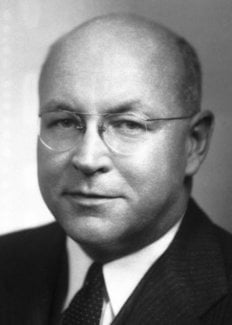Wendell M. Stanley
Biographical

Wendell Meredith Stanley was born in Ridgeville, Indiana, on August 16th, 1904. He began his advanced education at Earlham College and graduated Bachelor of Science in 1926 when he entered the University of Illinois, gaining a Master of Science degree in 1927 and a Ph.D. in chemistry in 1929. He continued at Illinois as a research associate and later as an instructor before leaving, in the latter half of 1930, to do research at Munich as a National Research Council Fellow. In Munich he worked with Heinrich Wieland until late 1931 when he returned to the United States to take up a post as Assistant at the Rockefeller Institute. He remained with the Institute until 1948, becoming an Associate Member in 1937, and a Member in 1940. In 1948, he was appointed Professor of Biochemistry and Director of the Virus Laboratory, University of California; during 1948-1953 he was Chairman of the Department of Biochemistry, and in 1958 he became Professor of Virology and Chairman of the Department.
Stanley has been responsible for much important work on lepracidal compounds, diphenyl stereochemistry and the chemistry of the sterols. His researches on the virus which causes the mosaic disease in tobacco plants led to the isolation of a nucleoprotein which displayed tobacco mosaic virus activity. The virus appeared to act like an inanimate chemical but it presented evidence of being a living and growing organism. His more recent work on the preparation and investigation of influenza and similar viruses has led to his development of the centrifuge-type influenza vaccine. He is a recognized world authority on viruses and, as such, he has written over 150 papers on the topic and contributed chapters to several books.
Professor Stanley was awarded the American Association for the Advancement of Science Prize in 1937, and his many other honours and awards include the Rosenburger Medal (University of Chicago), Alder Prize (Harvard), and Scott Award (City of Philadelphia), 1938; Gold Medal of the American Institute of New York, 1941; Copernican Citation, 1943; Nichols Medal (American Chemical Society), 1946; Gibbs Medal (American Chemical Society), 1947; Franklin Medal and Presidential Certificate of Merit, 1948; the Modern Medicine Award, 1958; and the American Cancer Society’s Medal for Distinguished Service in Cancer Control, 1963. He has been awarded honorary Doctor of Science degrees by many universities and colleges, including Earlham, Harvard, Yale (1938), Princeton (1947) and Illinois (1959); honorary Doctor of Law degrees of the Universities of California (1946) and Indiana (1951), the Jewish Theological Seminary of America (1953) and Mills College (1960); and Doctor, honoris causa, University of Paris (1947).
He has served on the Councils of many academic, medical and other learned societies, and as consultant and advisor to the United States government and the World Health Organization. He continues as Director-at-large, American Cancer Society and as a Member of the Board of Scientific Counsellors of the National Cancer Institute. He is a member of many scientific societies.
Wendell M. Stanley married Marian Staples on June 15th, 1929. They have one son, Wendell M. Junior, and three daughters, Marjorie Jean, Dorothy Claire, and Janet Elizabeth.
This autobiography/biography was written at the time of the award and first published in the book series Les Prix Nobel. It was later edited and republished in Nobel Lectures. To cite this document, always state the source as shown above.
Wendell M. Stanley died on June 15, 1971.
Nobel Prizes and laureates
Six prizes were awarded for achievements that have conferred the greatest benefit to humankind. The 14 laureates' work and discoveries range from quantum tunnelling to promoting democratic rights.
See them all presented here.
